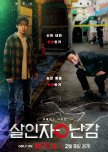Justice at a Crossroads, Morality in the Balance
"A Killer Paradox" throws viewers into a world where chance encounters and fateful decisions lead down a perilous path of vigilante justice. Lee Tang, a down-on-his-luck college student, stumbles upon a mysterious artifact that grants him glimpses into alternate timelines. Driven by a thirst for justice and fueled by personal grievances, he manipulates these glimpses to expose the corrupt and powerful. But as lines blur and consequences mount, Tang grapples with the weight of his actions and the unintended ripple effects his interventions create.
◆ Plot: A Web of Choices and Consequences: The narrative unfolds like an intricate puzzle, each decision Tang makes sending him down a different path with unforeseen outcomes. The absence of time travel eliminates the potential for repetitive loops and instead emphasizes the butterfly effect of his choices. This creates a constant sense of tension and uncertainty, keeping viewers guessing how each manipulation will play out. However, at times the complexity can be overwhelming, and the cause-and-effect relationships between Tang's actions and the resulting consequences aren't always fully explored.
◆ Characters: Morality in the Face of Fate: Lee Tang emerges as a flawed and complex protagonist. Choi Woo-shik delivers a captivating performance, showcasing Tang's internal struggle as he navigates the murky waters of vigilantism. The supporting cast is equally well-developed, each with its motivations and secrets that intertwine with Tang's journey. The enigmatic detective, the cunning villain, and even Tang's unwitting accomplices create a tapestry of characters that drive the narrative forward.
◆ Acting: Bringing the Paradox to Life: The talented cast breathes life into their characters. Choi Woo-shik masterfully portrays Tang's transformation from a disillusioned student to a determined vigilante, grappling with the weight of his choices. The supporting actors deliver equally compelling performances, adding depth and nuance to the narrative.
◆ Critical Analysis: Beyond Black and White Justice: "A Killer Paradox" transcends the typical vigilante narrative by delving into the complexities of morality and fate. The absence of time travel forces the story to confront the irreversible nature of consequences, challenging viewers to consider the ethical implications of Tang's actions. While the show doesn't shy away from portraying the emotional toll and potential dangers of vigilantism, it also raises questions about the limitations of the justice system and the societal forces that drive individuals to take matters into their own hands.
◆ In Conclusion: "A Killer Paradox" is a thought-provoking and suspenseful drama that challenges viewers to confront the complexities of fate, justice, and the consequences of our choices. While the absence might shift the focus, the show's strong performances, intricate plot, and exploration of moral dilemmas make it a rewarding watch for those seeking more than just a typical vigilante story.
◆ Plot: A Web of Choices and Consequences: The narrative unfolds like an intricate puzzle, each decision Tang makes sending him down a different path with unforeseen outcomes. The absence of time travel eliminates the potential for repetitive loops and instead emphasizes the butterfly effect of his choices. This creates a constant sense of tension and uncertainty, keeping viewers guessing how each manipulation will play out. However, at times the complexity can be overwhelming, and the cause-and-effect relationships between Tang's actions and the resulting consequences aren't always fully explored.
◆ Characters: Morality in the Face of Fate: Lee Tang emerges as a flawed and complex protagonist. Choi Woo-shik delivers a captivating performance, showcasing Tang's internal struggle as he navigates the murky waters of vigilantism. The supporting cast is equally well-developed, each with its motivations and secrets that intertwine with Tang's journey. The enigmatic detective, the cunning villain, and even Tang's unwitting accomplices create a tapestry of characters that drive the narrative forward.
◆ Acting: Bringing the Paradox to Life: The talented cast breathes life into their characters. Choi Woo-shik masterfully portrays Tang's transformation from a disillusioned student to a determined vigilante, grappling with the weight of his choices. The supporting actors deliver equally compelling performances, adding depth and nuance to the narrative.
◆ Critical Analysis: Beyond Black and White Justice: "A Killer Paradox" transcends the typical vigilante narrative by delving into the complexities of morality and fate. The absence of time travel forces the story to confront the irreversible nature of consequences, challenging viewers to consider the ethical implications of Tang's actions. While the show doesn't shy away from portraying the emotional toll and potential dangers of vigilantism, it also raises questions about the limitations of the justice system and the societal forces that drive individuals to take matters into their own hands.
◆ In Conclusion: "A Killer Paradox" is a thought-provoking and suspenseful drama that challenges viewers to confront the complexities of fate, justice, and the consequences of our choices. While the absence might shift the focus, the show's strong performances, intricate plot, and exploration of moral dilemmas make it a rewarding watch for those seeking more than just a typical vigilante story.
Esta resenha foi útil para você?


 1
1























